The good people of Delph – a little moorland village that had always been in the West Riding of Yorkshire until 40 years ago when, much to the residents’ chagrin, some daft London bureaucrat redrew the boundaries and lumped it in with the Lancashire town of Oldham – do bang the drum a bit about their Whit Friday Brass Band Contest.
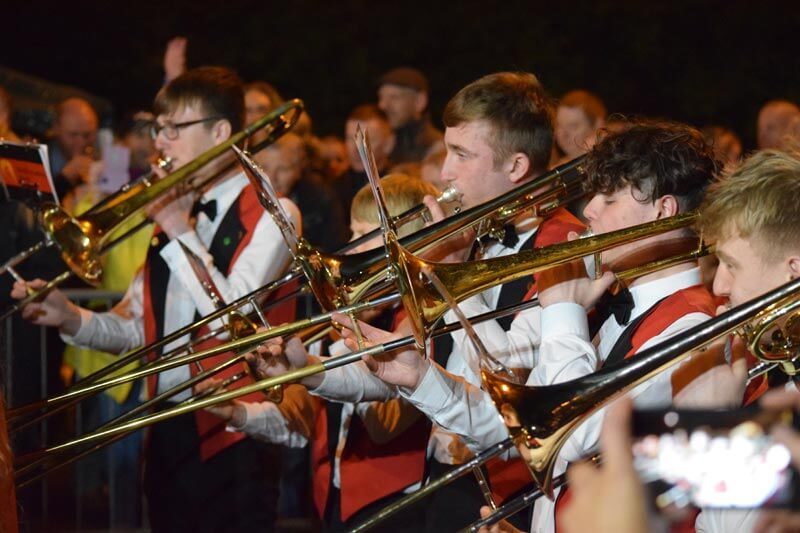 But who can blame them if they love to blow their own trumpet – and their trombones, French horns, flugelhorns and tubas – about what folk up there proudly, and rightly, describe as The Greatest Free Show on Earth?
But who can blame them if they love to blow their own trumpet – and their trombones, French horns, flugelhorns and tubas – about what folk up there proudly, and rightly, describe as The Greatest Free Show on Earth?
Every year, eight weeks after Good Friday, more than 100 brass bands from all over the country – and usually several from abroad, too – descend, along with thousands of spectators, on 11 villages in the Saddleworth region for the annual Whitsun contests.
It means that from about four o’clock in the afternoon until midnight, the Pennine valleys echo to the sounds of traditional brass band classics like Knight Templar, Ravenswood, Wizard, Castell Coch, Punchinello and Mephistopheles.
The crowds love it – especially with the pubs open all day. And so do the musicians. After all, there’s serious money to be made, with prizes totalling around £35,000 up for grabs.
Delph, neighbouring Denshaw, Uppermill – where it all started in 1884 – and several other villages all offer £1,000 for the best band of the day. Then there’s another £2,500 for the overall Saddleworth area champion.
That prize this year went to Brighouse and Rastrick, in their smart purple tunics. Their version of Knight Templar cleaned up at Delph, Dobcross, Greenfield, Grotton, Lees & Springhead and Lydgate to earn them more than £8,000.
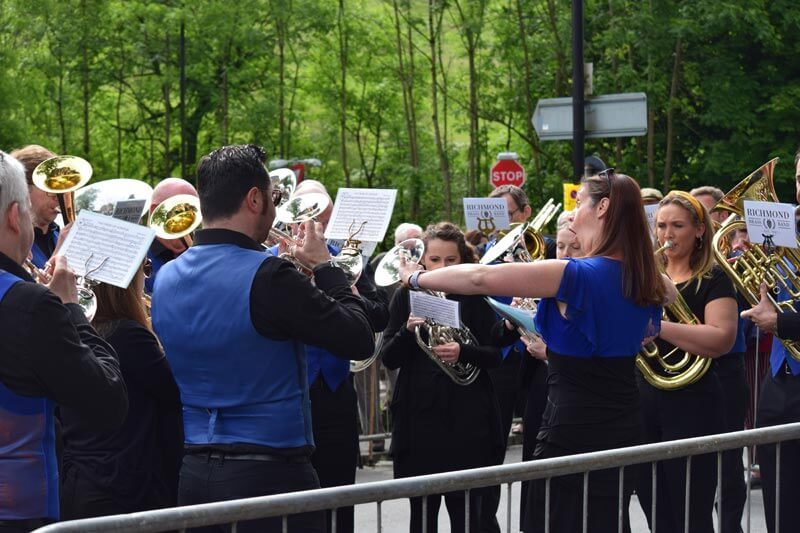 Delighted Musical director David Thornton said later: “Whit Friday is always a highlight of the year for the band. The atmosphere is fantastic.”
Delighted Musical director David Thornton said later: “Whit Friday is always a highlight of the year for the band. The atmosphere is fantastic.”
And it is. For most of the bandsmen, though, it’s not the glory of winning that matters, but the fun of taking part – even if they usually end up getting rather wet. For, unfortunately, rain on Whit Friday in this corner of England does seem as traditional as the music.
To be fair, after some early showers the weather this year isn’t too bad. “Not like 2018,” recalls Mary Rodgers. “Then it really rained, although I think 1972 was the worst. Absolutely horrendous.”
Delph born and bred, Mary and husband Bob, a bit of an incomer from neighbouring Denshaw down the road, have been helping organise the village contest for nigh on 50 years.
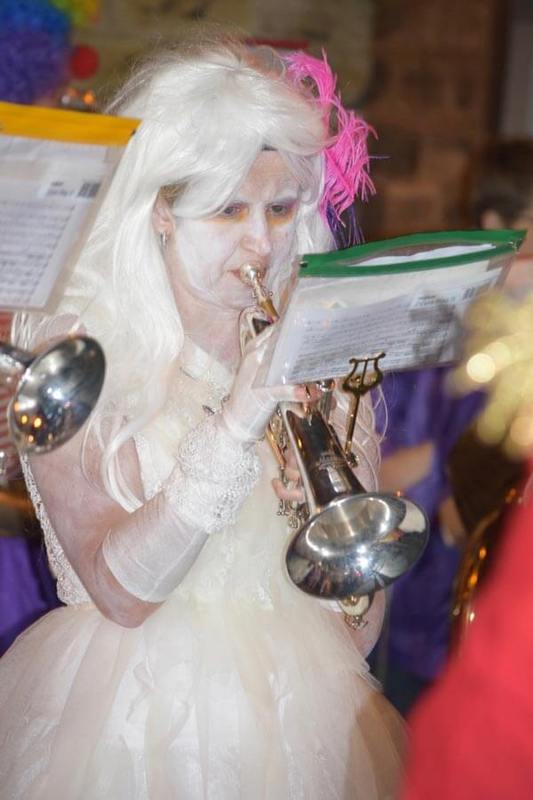 The place really got put on the map in the 1990s when part of the movie Brassed Off starring Pete Postlethwaite, Tara Fitzgerald and Ewan McGregor was filmed here.
The place really got put on the map in the 1990s when part of the movie Brassed Off starring Pete Postlethwaite, Tara Fitzgerald and Ewan McGregor was filmed here.
One classic scene shows two mounted police officers parting spectators as the fictional band – with music played by the real-life Grimethorpe Colliery Band – march down King Street on Whit Friday.
Mary, along with most of the locals, loves the film. But she reckons they got it wrong with the “flat cap image”, portraying band members as hard-drinking, working class blokes who have just stepped out of the pits and textile mills that once dotted the North.
“It used to be like that,” she says. “Nowadays though most of the bandsmen – and women, because there are a lot of women now – are clever, well educated people with degrees and in well-paid professional jobs.
“They have to be earning good money just to afford the instruments and people will travel the length of the country at weekends to play with the different bands.
“Brassed Off was brilliant, but you must remember it was a drama not a documentary. These days bands people don’t drink half as much as they used to – and they don’t wear flat caps either!”
The musicians are supposed to be amateur, but they are allowed to be paid expenses. And one insider hints that it often goes further than that. For where there’s bands, it seems, there’s also brass.
“Some are professional in all but name,” he whispers. “Nobody will admit it, of course, but it’s a bit like football with a top cornet or tuba player being slipped a ‘signing on fee’ to transfer to another band in the next village.”
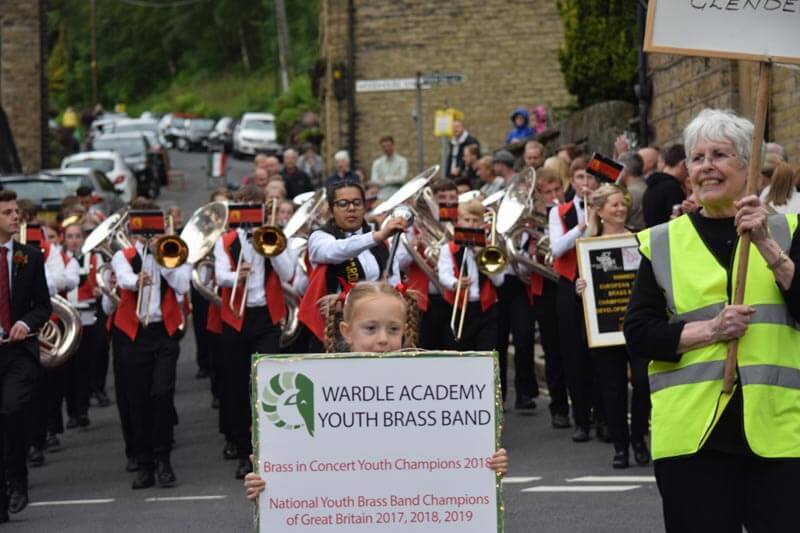 In fact, the similarity with football doesn’t end there. For the bands also have their own divisions with promotion and relegation between them.
In fact, the similarity with football doesn’t end there. For the bands also have their own divisions with promotion and relegation between them.
The Championship is like the Premier League, full of the big boys like Cory, Grimethorpe, Black Dyke, Foden’s and this year’s Saddleworth winners Brighouse & Rastrick. Then there are First, Second, Third and Fourth Sections.
There is also a Youth Section, some of whose members – such as Wardle Academy, from Rochdale, who win eight Best Youth Band prize on Whit Friday – could more than hold their own among the First Section bands.
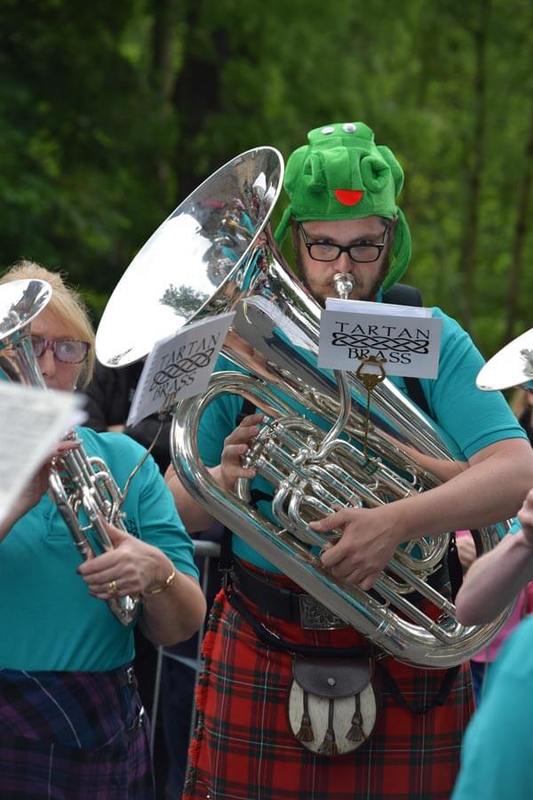 Delph always attracts a good cross-section, of course. There are impeccably turned-out bands like Brighouse and the Branton Silver Band, who march in perfect step as they play, and then there are the unregistered ‘scratch’ bands like Tartan Brass and Chav Brass.
Delph always attracts a good cross-section, of course. There are impeccably turned-out bands like Brighouse and the Branton Silver Band, who march in perfect step as they play, and then there are the unregistered ‘scratch’ bands like Tartan Brass and Chav Brass.
These are musicians who come together solely for events like Whit Friday. Some members of Tartan Brass have never even met before they catch the coach together down from Glasgow on the night before the contest.
But they get one of the biggest cheers of the day as they unfurl a giant Saltire and march down the main street playing a rousing version of “I could walk 500 miles …”.
Printed on the backs of their blue shirts are their nicknames. There’s “Su Blow” and “Big Aldo”, and the female conductor whose shirt, rather cheekily, proclaims “I Touch My Delph”.
Tartan Brass certainly have a lot of fun, but they don’t win any prize money. Chav Brass do, though.
These guys may look like a bunch of layabouts as they slouch around swigging cans of beer in their hoodies, garish shellsuits and baseball caps before, led by blaring trombones, they skip through Delph playing their arrangement of Bryan Adam’s Heaven. But they are brilliant musicians culled from an array of top bands and orchestras.
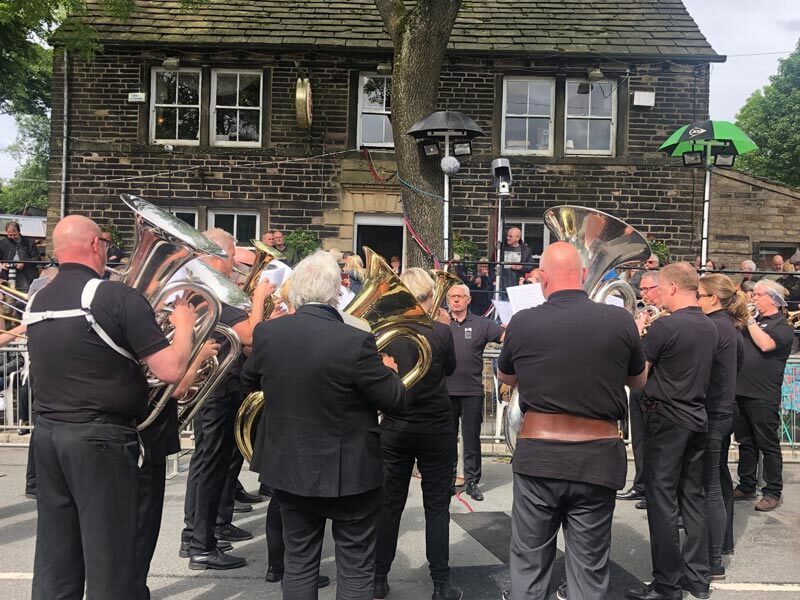 Later outside Delph’s Methodist church, they play their “test piece”, Knight Templar, for adjudicator Mike Kilroy, who is sat upstairs inside the building with his back firmly turned to the window.
Later outside Delph’s Methodist church, they play their “test piece”, Knight Templar, for adjudicator Mike Kilroy, who is sat upstairs inside the building with his back firmly turned to the window.
To keep everything impartial, local lad Mike, current chairman of Brass Bands England who has played his euphonium with some of the country’s top bands, is forbidden to turn round and look out. So he doesn’t know the identity of Chav Brass, only their contest number.
Nevertheless, he is impressed enough to give them seventh place overall. They do even better at neighbouring Uppermill, coming second. With a third place at Denshaw, sixth at Diggle and a “Best Entertainment” prize at Greenfield, they will pick up more than £1,300 on the day.
Mary Rodgers is not terribly keen on the scratch bands. At the age of 72, and brought up on traditional brass band music, she is something of a purist – even, she says with a laugh, “a bit of an old-fashioned fuddy-duddy”.
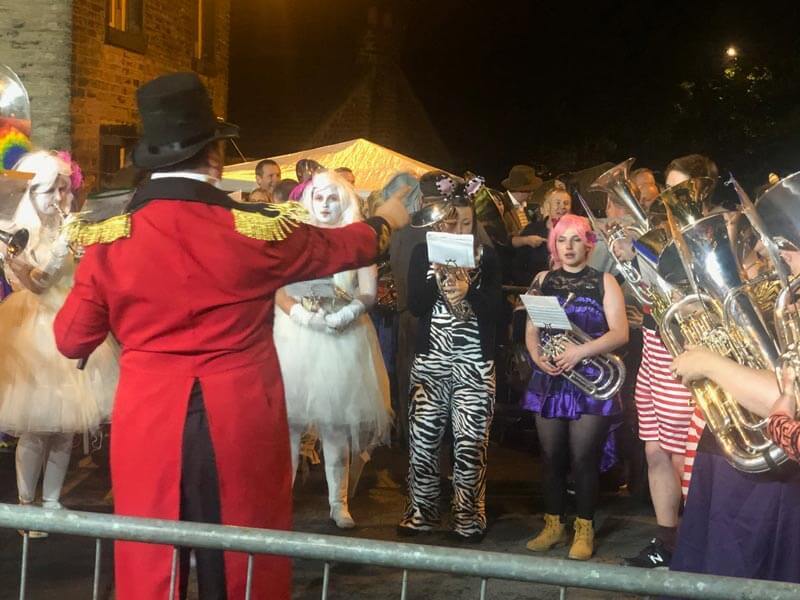 But the scratch bands do add to the fun, carnival atmosphere and help draw the Whit Friday crowds. And Mary admits that many of their members – like trombonist Jon Stokes with Bad Ass, another colourful band who donate their prize money to local charities – are top class musicians.
But the scratch bands do add to the fun, carnival atmosphere and help draw the Whit Friday crowds. And Mary admits that many of their members – like trombonist Jon Stokes with Bad Ass, another colourful band who donate their prize money to local charities – are top class musicians.
In some ways, though, she does hanker after the gentler days of the contest in the 1970s and 1980s, when there were fewer bands, smaller crowds and everyone got together in the village’s Band Club (excellent Wainwright bitter at just £2.60 a pint, by the way).
Nowadays, what with all this health and safety malarkey, before the contest can go ahead Mary and the committee must sit down and draw up a 15-page “Event Plan” full of “risk assessments” for the local council and the police. Stewards and security have to be arranged, and where once the contest could drag on into the early hours, now the last band must have played by midnight so the police can reopen local roads blocked to through traffic.
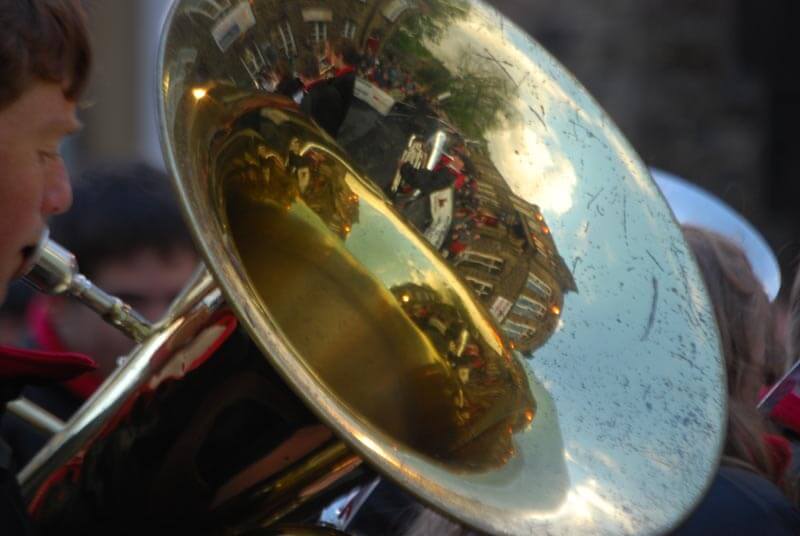 “It’s all rush, rush, rush,” says Mary wearily. “Barely is one contest over than we have to start planning for the next one.”
“It’s all rush, rush, rush,” says Mary wearily. “Barely is one contest over than we have to start planning for the next one.”
But that won’t stop her. It’s a labour of love for her and hubby Bob. They are already getting excited about 2020.
Whit Friday falls on June 5 next year. And if Mary has anything to do with things, it will be the best band contest yet.
I’ve already booked my hotel so I can be there, and I recommend you do too. After all, remember what they say up in Delph: It’s the Greatest Free Show on Earth. You can’t argue with that.
More about Malcolm
Malcolm ‘Mal’ Tattersall spent almost 40 years working as a staff journalist on some of Britain’s biggest-selling tabloid newspapers. Originally from Lancashire, he once found himself under house arrest in a brothel after a military coup in Africa, taught English in Istanbul, narrowly avoided being thrown in Turkey’s notorious Midnight Express prison, and, for a brief period, was a brickie’s mate labouring on a building site in Muskogee, Oklahoma. Now semi-retired, Mal loves travelling, writing and supping real ale – although not necessarily in that order.











